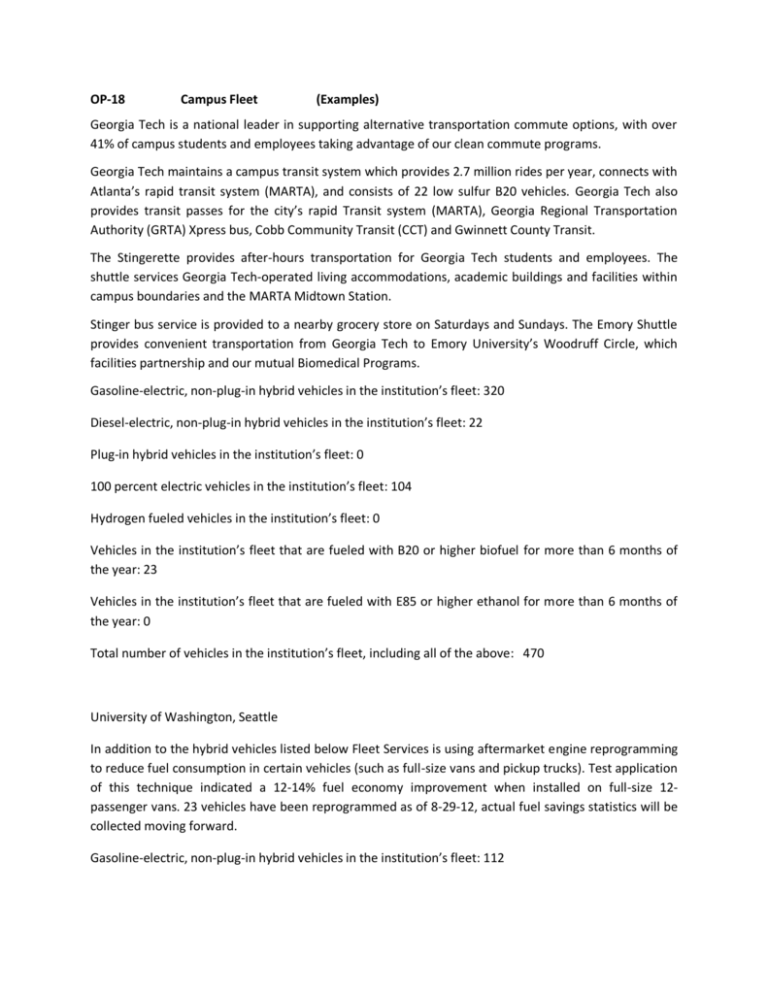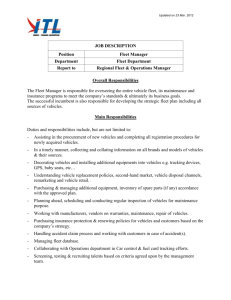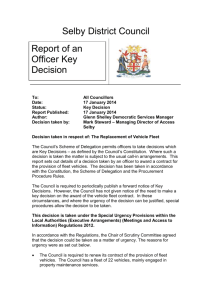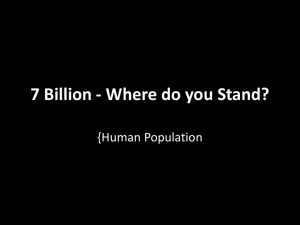OP-18 Campus Fleet (Examples) Georgia Tech is a national leader
advertisement

OP-18 Campus Fleet (Examples) Georgia Tech is a national leader in supporting alternative transportation commute options, with over 41% of campus students and employees taking advantage of our clean commute programs. Georgia Tech maintains a campus transit system which provides 2.7 million rides per year, connects with Atlanta’s rapid transit system (MARTA), and consists of 22 low sulfur B20 vehicles. Georgia Tech also provides transit passes for the city’s rapid Transit system (MARTA), Georgia Regional Transportation Authority (GRTA) Xpress bus, Cobb Community Transit (CCT) and Gwinnett County Transit. The Stingerette provides after-hours transportation for Georgia Tech students and employees. The shuttle services Georgia Tech-operated living accommodations, academic buildings and facilities within campus boundaries and the MARTA Midtown Station. Stinger bus service is provided to a nearby grocery store on Saturdays and Sundays. The Emory Shuttle provides convenient transportation from Georgia Tech to Emory University’s Woodruff Circle, which facilities partnership and our mutual Biomedical Programs. Gasoline-electric, non-plug-in hybrid vehicles in the institution’s fleet: 320 Diesel-electric, non-plug-in hybrid vehicles in the institution’s fleet: 22 Plug-in hybrid vehicles in the institution’s fleet: 0 100 percent electric vehicles in the institution’s fleet: 104 Hydrogen fueled vehicles in the institution’s fleet: 0 Vehicles in the institution’s fleet that are fueled with B20 or higher biofuel for more than 6 months of the year: 23 Vehicles in the institution’s fleet that are fueled with E85 or higher ethanol for more than 6 months of the year: 0 Total number of vehicles in the institution’s fleet, including all of the above: 470 University of Washington, Seattle In addition to the hybrid vehicles listed below Fleet Services is using aftermarket engine reprogramming to reduce fuel consumption in certain vehicles (such as full-size vans and pickup trucks). Test application of this technique indicated a 12-14% fuel economy improvement when installed on full-size 12passenger vans. 23 vehicles have been reprogrammed as of 8-29-12, actual fuel savings statistics will be collected moving forward. Gasoline-electric, non-plug-in hybrid vehicles in the institution’s fleet: 112 Diesel-electric, non-plug-in hybrid vehicles in the institution’s fleet: 5 Plug-in hybrid vehicles in the institution’s fleet: 3 100 percent electric vehicles in the institution’s fleet: 0 Vehicles in the institution's fleet that are fueled with Compressed Natural Gas (CNG): 0 Hydrogen fueled vehicles in the institution’s fleet: 0 Vehicles in the institution’s fleet that are fueled with B20 or higher biofuel for more than 6 months of the year: 57 Vehicles in the institution’s fleet that are fueled with E85 or higher ethanol for more than 6 months of the year: 0 Total number of vehicles in the institution’s fleet, including all of the above: 628







![[STORY ARCHIVES IMAGE]](http://s3.studylib.net/store/data/007416224_1-64c2a7011f134ef436c8487d1d0c1ae2-300x300.png)